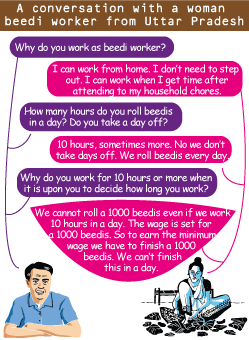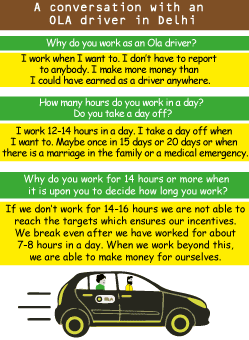The Past
On 1 May 1886, trade unionists, political activists and large number of workers came together to make the city of Chicago the centre of the growing national movement for an eight-hour workday. Between 25 April and 4 May, workers across the city attended several meetings and marched through the streets more than a dozen times. On 1 May, an estimated 35,000 workers walked off their jobs. Tens of thousands more, both skilled and unskilled, joined them on 3 and 4 May. Protestors marched from workplace to workplace urging fellow workers to join the strike. Police clashed with strikers at several areas. At the McCormick reaper plant, a long-simmering strike erupted into violence on 3 May and the police fired at the strikers, killing at least two. This triggered a protest at the Haymarket Square where once again the police fired on striking workers, killing several people. The police claimed that ‘someone’ hurled a bomb at the police which prompted them to fire upon the protestors. The identity of this ‘bomber’ was never revealed. The 8 organisers of the Haymarket protest were convicted, with 7 of them sentenced to death, despite no credible evidence against them. Legal appeals failed. 4 of the convicted organisers were hanged soon after and 1 committed suicide. Thousands attended their funeral. In 1893, seven years later, three of the imprisoned defendants were granted absolute pardon, citing the lack of evidence against them and the unfairness of the trial.
Inspired by this movement for a shorter workday, socialists and trade unionists around the world began celebrating 1 May as the International Workers’ Day. The 1904 Sixth Conference of the Socialist International called on “all Social Democratic Party organisations and trade unions of all countries to demonstrate energetically on the First of May for the legal establishment of the 8-hour day, for the class demands of the proletariat, and for universal peace.”
From after the World War I till well into the 1970s and 1980s, trade unions across the world have been able to win significant rights for its members on working hours, working conditions and wages.
The Present
The struggle for an 8 hour workday is now over a century and a half years old and yet not over. It is more relevant today than it was ever before. What a worker produced in a year in the 1890s is what she produces in a month or maybe even in a day today. Technological advancement, reorganisation of work through factory system, large scale production for mass consumption and ware have been the main drivers of this huge productivity increase. With increasing mechanisation, every minute now counts.
Situation 1: Even if a worker works for only 8 hours, the employers ensure that every second in that 8 hours is made productive. Workers are not able to take tea breaks, they are not able to take toilet breaks, they are not able to talk to their fellow workers. Thus the struggle for an 8 hour day is far more complicated today than it used to be. The struggle for an eight hour day today also means a struggle for rest breaks within that 8 hours, reduction of work intensity in that 8 hours, non-discrimination between regular and irregular workers within that 8 hours and in many areas of work a guarantee of 8 hours work for 6 days a week.
Situation 2: A large number of workers especially in the service sector today across the world are on contracts where employers are not required to provide a fixed minimum number of working hours and hence have no guaranteed monthly income or social security. The workers have to be on call every day of the week at all hours to take the work that they are offered. As a result workers are forced to work in more than one job like those on the zero-hour contract.
Situation 3: Today a large number of workers across the world are also not bound by fixed working hours. They have flexi-hours of work. They are made to believe by their employers that they have the right to choose their hours of work and work as and when they want to.


The two conversations from two ends of the spectrum of work shows very clearly that there is not much scope for choice given the unachievable targets that are set to earn a minimum wage. Thus flexibility of work time is only an illusion created by the employers – in reality, workers end up working much longer than 8 hours a day to earn a minimum wage.
How to do employers succeed in fooling so many people so many times and across so many countries?
Here we shall only consider the three situations that we mentioned above. There are many more ways in which we are fooled everyday by our employers.
Situation 1: In which workers constantly work harder and produce more every cycle
As a worker, we are told by our employers that if we work harder we can rise in the organisation. We shall earn incentives. We shall be promoted. We can even become the CEO of the company if we just work hard enough. Somehow we like to believe this and we do. Our popular movies also feed this illusion to us. We believe that a worker in a factory, if he works hard enough can inherit the factory from the benevolent employer and get his lovely daughter too. The crucial fact that we forget is that the worker was as dashing as Shah Rukh Khan or Rajnikant who the beautiful daughter of the employer fell in love with!
This incentive model also tells us that we can out-do our co-workers and be paid more than them. It makes us compete against each other. It makes us push each other to work harder. We no longer need supervisors to push us to work harder. We do it ourselves. This not just increases productivity but also makes every worker suspicious of the others. Thus the notion of a collective identity as a worker is destroyed. Thus each one tries to survive in this rat race by trying to overtake the other and we all get fooled into working more and more.
The philosophy that those who work hard, succeed is something that people have started believing. People ignore that there are some born with privileges and they are the ones who are always ahead of others. There is a political demand from the privileged minority to get rid of reservation in government employments. This too stems from this understanding that merit should be the basis for eligibility in all employments. We have wilfully forgotten that it is only a small minority of upper caste, male citizens of our country who have had the privilege to make choices and privilege of access to education, to employment for over a hundred years. It continues to be this small minority who now opposes reservation and talks about merit. Merit cannot be determined as an absolute faculty. It is determined as a factor of privileges enjoyed over several generations. It is therefore important to understand that equality in access to everything can only be ensured if we ensure reservation in education, in employments and in access to almost everything.
Situation 2: In which workers accept shorter working hours and end up in multiple jobs
Workers, in most cases women workers, initially accepted shorter and flexible hours of work because they thought this will give them time to spend at home. Women were exhausted with the double burden of an 8 hour workday and attending to household chores including a bulk of the care work. In the late 1980s and the 1990s when governments across the world started dismantling the social infrastructure of public schooling, public healthcare, old age benefits, it became more and more difficult for women to work an 8 hour shift. With patriarchy still in place, she was once again burdened with dealing with infants with no crèche facility, with a child back from school with no day care facility available or too expensive to afford, with aging parents with no social security, with caring for ailing members of family as care got privatised. This forced the need for flexi-timing.
Employers reached a win-win situation. Some employers benefited from the privatisation of education, healthcare, pension by being in that business and some benefited from the fact that now they had access to a pool of workers who need work but are burdened by their family responsibilities and hence will accept any terms of work. This today has got us to the Zero hour contracts. Thus we need to look at the requirement of workers for flexibility from the glass of disappearing public education, public care services, public healthcare and other social infrastructure and the acceptance of the fact that it is the woman’s job to do care work.
Situation 3: In which workers accept flexi work schedules as opposed to an 8 hour workday.
This happens when workers have very little choice in terms of access to employment. Both in the case of the Ola driver and the beedi worker, access to other employments is very limited. Thus, even though they are made to live in this illusion that they chose this work because they had flexibility, they soon realise they are caught in a vicious cycle of meeting targets and hence putting in much longer hours of work. As there is lack of access to alternate employments, workers are not able to shift to other work. The shift for a beedi worker is not possible as she is not allowed to go out of her home and seek employment while the shift for an Ola driver is not possible as he has already invested in the car and is stuck with it.
These situations are very different. The employment relations are different. The nature of work and workers are different. But one common string links them: it is the philosophy of individual progress. All these workers are isolated but they all believe they will survive through hard work. This keeps them going but keeps them away from collective struggles and action to change their condition of work and life. Transforming individual identity of working people, which capital promotes for its own advantage, into the collective will of the working class is what the trade unions have always struggled with and will continue to do so.

